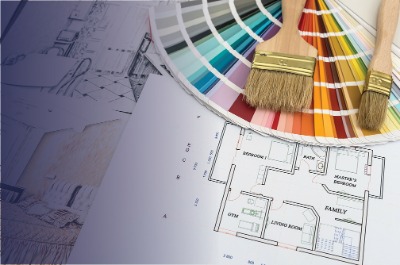Should you buy new or renovate your current home?
 Sometimes it’s hard not to be tempted by the greener grass of a new home, especially if your home isn’t exactly how you want it to look or function. But the idea of putting your house on the market and leaving your beloved neighborhood behind breaks your heart. You’re at a real estate crossroads — something has to change, but is it better to buy a new house or renovate your current address?
Sometimes it’s hard not to be tempted by the greener grass of a new home, especially if your home isn’t exactly how you want it to look or function. But the idea of putting your house on the market and leaving your beloved neighborhood behind breaks your heart. You’re at a real estate crossroads — something has to change, but is it better to buy a new house or renovate your current address?New House Benefits
A new house can be the answer to your current home’s woes. Perhaps you need more space for your growing family or less square footage now that the kids have flown the nest. Or, the location of your home isn’t the retreat you’ve dreamed of, and a house in a quieter neighborhood or with incredible views will better fulfill your wish list.
New House Negatives
The cost of buying a home goes well beyond the listing price. Realtor and title fees, closing and moving costs and money you’ll have to shell out for repairs and renovations to your current home before you list it on the market can add up quickly, obliterating your budget.
“The cost of moving even a short distance can climb quickly — north of $10,000 — if you’re hiring full-service movers, and it can still reach above $1,000 for just a moving van rental. Especially if you’re expecting a modest net profit on your house, the additional cost to relocate may not be worth it,” according to U.S. News & World Report Real Estate editor Devon Thorsby.
Is the market favorable? Perhaps it’s a buyer’s market, which might impact how long it takes your home to sell. If you buy before you sell, can you realistically balance two mortgages?
Home Improvement Pros
Whether you’ve been in your house for a year or 20, you’ve made memories and attachments to your current home. If you remodel, you won’t have to leave your emotional connections behind or disrupt your day-to-day routine. A new house might not seem that great after all if it adds significant time to your daily commute or means your kids have to switch schools. A home improvement project you control means the results will be exactly what you want. Yes, you might like the master suite in a new house, but you can love the one you design yourself in your current home.
“You may want an open floor plan between the kitchen and family room to make it easier for the family to hang out, for example. Or, if you’re retired, your renovations may focus on updates that help you age in place so you can stay in your home longer,” writes Thorsby.
Home Improvement Cons
While renovating your current home can offer personalized results, it’s not without its drawbacks. One of the biggest challenges is the potential for unexpected costs. Even with careful planning, renovation projects often exceed the initial budget due to unforeseen issues, like structural problems or the need for upgraded materials. These unexpected expenses can quickly add up, leaving you with a project that’s far more expensive than you originally anticipated.
Another significant downside is the disruption to your daily life. Depending on the scope of the renovation, you might have to live in a construction zone for weeks or even months. This can be particularly stressful if you’re dealing with essential areas of your home, like the kitchen or bathrooms. In some cases, you may need to temporarily move out, adding the cost of alternative housing to your budget.
There’s also the risk that your renovations may not add as much value to your home as you hoped. While some upgrades, like kitchen remodels or bathroom renovations, tend to offer a good return on investment, others might not increase your home’s value enough to justify the expense. If the housing market in your area is slow or if the renovations are highly personalized, you might struggle to recoup your costs when it’s time to sell.
Finally, consider the emotional toll of a renovation. Managing contractors, making countless decisions, and dealing with delays or mishaps can be overwhelming. The stress of a major remodel can strain your relationships and lead to frustration, especially if the project takes longer or costs more than expected.
Making the Decision
Deciding whether to buy a new house or renovate your current one depends on your personal circumstances, budget, and long-term goals. If you love your neighborhood and have a strong emotional connection to your home, a renovation might be the better option, despite the potential challenges. On the other hand, if your current home no longer meets your needs or if the cost of renovation would be prohibitive, buying a new house might be the wiser choice.
Ultimately, the decision should be based on careful consideration of all the factors involved, including the financial implications, the potential for disruption, and your long-term plans. Whether you choose to move or improve, the key is to ensure that your decision aligns with your lifestyle and future goals.
Find a mortgage that works for you.



